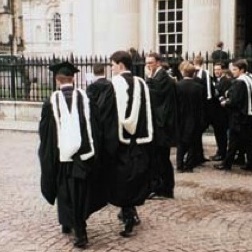First and Second Years
Most undergraduate courses are called ‘Tripos’ here at Cambridge, and when students start the Veterinary Medicine course, they will be undertaking study which forms the Medical and Veterinary Science Tripos (MVST). The MVST is the pre-clinical course for students wishing to become doctors or vets. During this course, students receive their lectures and practical teaching in various university departments - either as a vet-only group, alongside natural scientists (which is a separate Tripos), or medical students. Veterinary students also attend teaching sessions at the Vet School throughout their first and second years.
In the first two years (Parts IA and IB) some of the constituent courses are taken in common by both sets of students, while some are parallel.
I loved the breadth and depth of pure science. Supervisions were a wonderful opportunity to learn, and laboratory practices (particularly anatomy and pathology) were really useful and enjoyable.
Katherine 2015
In the first two years of the course, the colleges consolidate and amplify student learning by the provision of 'supervisions' - teaching sessions for small groups of two to four students, highlighting areas of clinical relevance in the veterinary course. These supervisions are a unique feature of the Cambridge student experience.
Vet students will have animal handling classes and assessments of these handling skills in their first year as part of the Principles of Animal Management course, and go on to develop their knowledge of the professional and social responsibilities of veterinary surgeons in the second year course Preparing for the Veterinary Profession.
For more information about the preclinical years of the course, please go to the following link:
http://www.biology.cam.ac.uk/undergrads/mvst
Third Year
After the first two years, students will progress into their third year (Part II year), which is similar to intercalated courses offered by other universities, during which they pursue a subject of their choice for a whole year. This year gives Cambridge veterinary students an unparalleled and exciting opportunity to work with researchers at the cutting edge of their field, and they often also carry out an in-depth research project of their own. Most vet students study a biological subject - ranging from zoology to developmental neuroscience to the history and philosophy of science - but non-scientific subjects may occasionally be chosen, such as Business Studies.
I really enjoyed the intellectual challenge, cutting edge information, particularly during my third year, and the diversity of the material that we were learning.
Emily 2015
At the end of the third year, vet students receive a full Cambridge BA degree equivalent to that awarded to Natural Scientists - and having such a qualification from the world's premier science university can prove invaluable in their later career. This is why the Cambridge course is one year longer than the other UK veterinary schools, and you should bear in mind that this is one of the most distinctive feature of the Cambridge course.
